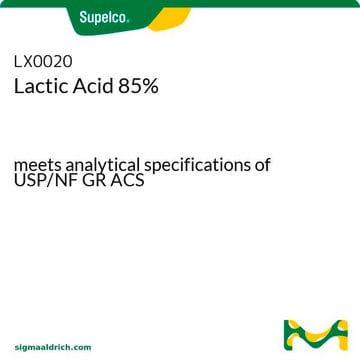L6661
Lactic acid
meets USP testing specifications
Synonym(s):
DL-Lactic acid, 2-Hydroxypropionic acid
About This Item
meets USP testing specifications
Recommended Products
Agency
USP/NF
meets USP testing specifications
Quality Level
Assay
88.0-92.0%
form
viscous liquid
refractive index
n20/D 1.425 (lit.)
pH
2
bp
122 °C/15 mmHg (lit.)
density
1.209 g/mL at 25 °C (lit.)
cation traces
heavy metals: ≤0.001%
application(s)
pharmaceutical (small molecule)
storage temp.
room temp
SMILES string
CC(O)C(O)=O
InChI
1S/C3H6O3/c1-2(4)3(5)6/h2,4H,1H3,(H,5,6)
InChI key
JVTAAEKCZFNVCJ-UHFFFAOYSA-N
Looking for similar products? Visit Product Comparison Guide
Related Categories
Biochem/physiol Actions
Other Notes
Signal Word
Danger
Hazard Statements
Precautionary Statements
Hazard Classifications
Eye Dam. 1 - Skin Corr. 1C
Supplementary Hazards
Storage Class Code
8A - Combustible corrosive hazardous materials
WGK
WGK 1
Flash Point(F)
235.4 °F - closed cup
Flash Point(C)
113 °C - closed cup
Personal Protective Equipment
Choose from one of the most recent versions:
Certificates of Analysis (COA)
Don't see the Right Version?
If you require a particular version, you can look up a specific certificate by the Lot or Batch number.
Already Own This Product?
Find documentation for the products that you have recently purchased in the Document Library.
Customers Also Viewed
Chromatograms
application for HPLCapplication for HPLCOur team of scientists has experience in all areas of research including Life Science, Material Science, Chemical Synthesis, Chromatography, Analytical and many others.
Contact Technical Service



